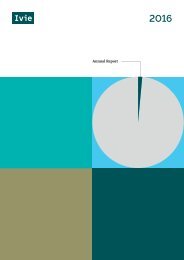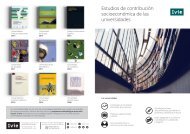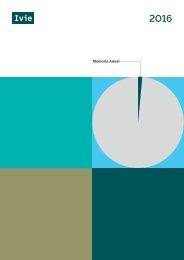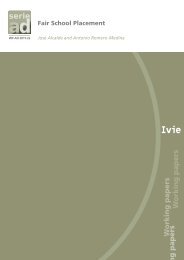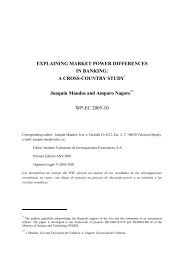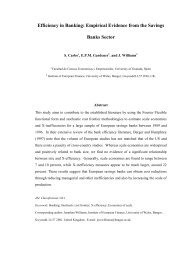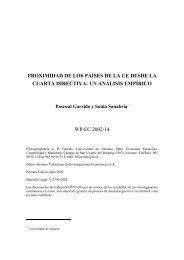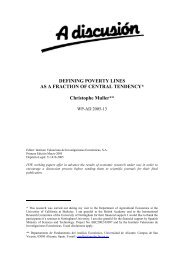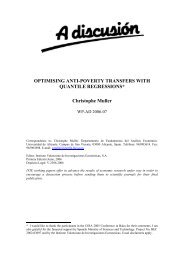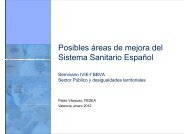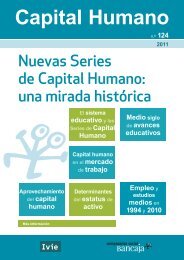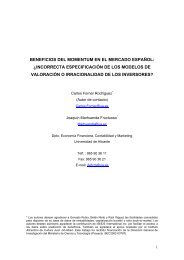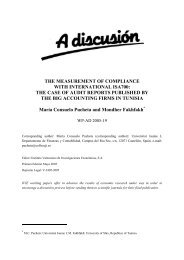You also want an ePaper? Increase the reach of your titles
YUMPU automatically turns print PDFs into web optimized ePapers that Google loves.
⎯ A comparative analysis based on a broad set of socio-economic indicators for 47 European cities with<br />
more than 450,000 inhabitants, grouped into four thematic blocks: the socio-economic structure, the<br />
quality of life, the accessibility and knowledge society.<br />
⎯ A comparison with five Spanish cities that are potential competitors of Valencia and the Valencia<br />
Activa project, i.e., Madrid, Barcelona, Malaga, Seville and Zaragoza.<br />
⎯ Based on the wide range of indicators used, the (internal) strengths and weaknesses have been<br />
identified as well as the threats and opportunities (of the environment), building a SWOT of Valencia<br />
which outlines the key elements of Valencia’s ability to compete with other territories and to attract<br />
both investment and population.<br />
Research team:<br />
Joaquín Maudos (<strong>Ivie</strong>, Universitat de València)<br />
Laura Hernández (<strong>Ivie</strong>)<br />
• IMPACT ANALYSIS<br />
ANALYSIS OF THE SOCIOECONOMIC IMPACT OF UNIVERSITIES<br />
In 2012, the <strong>Ivie</strong> conducted studies for the National Distance Education University (UNED), the University of<br />
the Basque Country and the five public Universities of the Valencian Community. The objective was to<br />
determine the magnitude of the contributions made by these higher education institutions, estimating their<br />
impact and identifying the change of direction which should be encouraged to further improve their results. The<br />
following areas were explored in each study per university: evaluation of the activities undertaken by the<br />
university, analysis of the socioeconomic environment, and a quantitative estimation of the impacts in terms of<br />
demand (short term) and supply (long term) regarding production and income, employment, growth and tax<br />
revenues. The following <strong>report</strong>s are the results of this line of research conducted by the <strong>Ivie</strong> on behalf of the<br />
universities mentioned above:<br />
THE SOCIOECONOMIC CONTRIBUTION OF THE VALENCIAN PUBLIC UNIVERSITIES (2011-2012)<br />
THE SOCIOECONOMIC CONTRIBUTION OF THE UNIVERSITY OF THE BASQUE COUNTRY (2012)<br />
THE SOCIOECONOMIC CONTRIBUTION OF THE UNED (2012)<br />
Research team:<br />
Francisco Pérez (<strong>Ivie</strong>, Universitat de València)<br />
José Manuel Pastor (<strong>Ivie</strong>, Universitat de València)<br />
Carlos Peraita (Universitat de València)<br />
Rodrigo Aragón (<strong>Ivie</strong>)<br />
Ángel Soler (<strong>Ivie</strong>, Universitat de València)<br />
Irene Zaera (<strong>Ivie</strong>)<br />
ECONOMIC IMPACT OF THE DIVINA PASTORA VALENCIA MARATHON (2011-2012)<br />
This study, commissioned by the Municipal Sports Foundation of Valencia, quantifies the economic impact of<br />
the celebration of the 31st and 32nd Divina Pastora Valencia Marathons, which took place in 2011 and 2012<br />
respectively, in terms of production, income (value added) and employment of the Valencian economy. The<br />
expenditure required to host the event as well as the tourist expenditure made by the participants during their<br />
stay in Valencia have been estimated. Once the full direct costs associated to the marathons are computed, the<br />
overall impact is estimated using the input-output methodology.<br />
Research team:<br />
Joaquín Maudos (<strong>Ivie</strong>, Universitat de València)<br />
Eva Benages (<strong>Ivie</strong>)<br />
Research and economic studies 49



